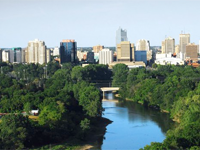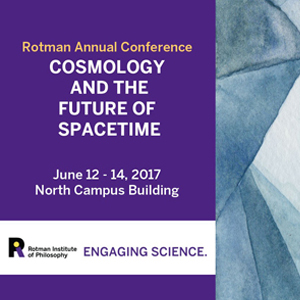Cosmology and the Future of Spacetime | Rotman Conference
Room: 295
Cosmology and the Future of Spacetime is a three-day conference taking place June 12-14, 2017 at Western University in London, Ontario, Canada.
Actual event times will be updated once a conference schedule is confirmed. To view full details about the conference, please visit the conference page on the philosophy of cosmology website.
Please register by no later than June 5, 2017.
Even though general relativity has enjoyed profound success throughout the century since its discovery, there are at least two reasons to think that it may have to undergo small, albeit possibly profound, revisions. One reason, essentially uncontroversial, is the open problem of how to unify general relativity with quantum theory, while the second reason, essentially controversial, regards whether certain dynamical anomalies in astronomy and cosmology are best explained in terms of new, otherwise undetected forms of matter, or in terms of a modification of gravitational theory.
We will explore these two themes from a more specific angle. In particular, the conference speakers will address the issue of “spacetime emergence” within certain approaches to quantum gravity in a cosmological setting. If, as is usually taken to be the case, general relativity breaks down as a classical initial singularity is approached, what could this mean for the view of spacetime as emergent in the early universe? Does the thermodynamic arrow of time require treating initial and final singularities differently and thereby impose fundamental constraints on the structure of a future theory of quantum gravity? More generally, what could in principle even be meant by a physical theory without at least some underlying notion of spacetime?
Similarly, if the path is pursued of modifying general relativity (MOND, TeVeS, f(R), torsion, etc.) in order to avoid the new forms of matter and/or energy that the cosmological concordance model posits, what does this mean for the lessons about matter, motion, gravity and spacetime that Einstein taught us? We will also consider recent work that clarifies the space of alternatives to general relativity, in order to assess the viability of proposals to emulate general relativity’s success at length scales where it has passed stringent tests, while differing at cosmological scales.
This conference will be followed by a graduate student conference, the 17th Annual Philosophy of Logic, Math and Physics (LMP) Graduate Student Conference.






